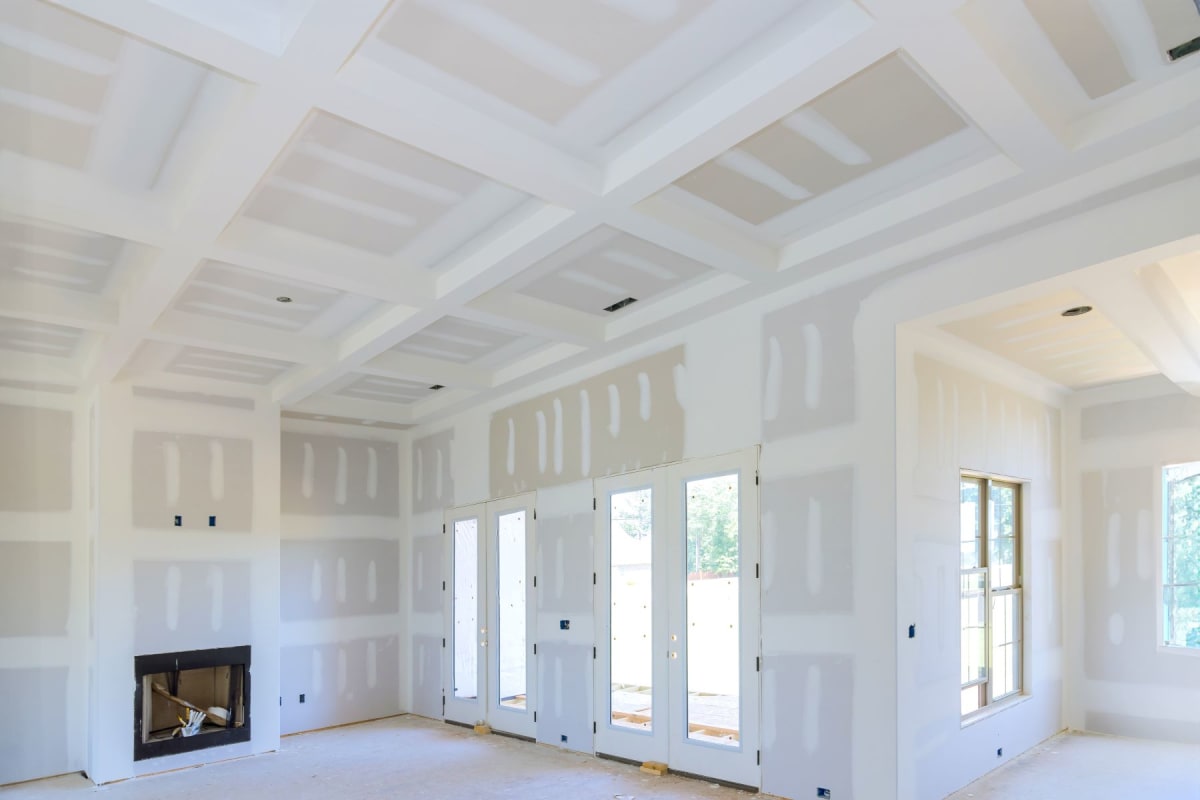
How much does it cost to drywall a basement?
How much does it cost to drywall a basement?
$1,500 – $7,000 average cost (1,000 SF basement)
Average cost to drywall a basement
Basement drywall costs $1.50 to $3.50 per square foot of wall surface, or $30 to $70 per sheet, covering labor and materials to hang, tape, and finish the drywall. Drywalling costs $1,500 to $7,000 for a 1,000-square-foot basement, depending on if the floorplan is open or divided into smaller rooms.

| Basement size | Average cost |
|---|---|
| Small (700 SF) | $1,200 – $6,000 |
| Average (1,000 SF) | $1,500 – $7,000 |
| Large (1,500 SF) | $2,000 – $9,000 |
Basement drywall cost factors
The cost of drywall installation depends primarily on your basement size and configuration. Larger basements and those with more walls require more materials and labor, directly increasing costs. Several other factors can influence costs:
Drywall type: The choice between standard drywall, moisture-resistant drywall, or specialized options like soundproof panels can significantly affect the material costs and long-term performance in your basement environment.
Drywall finish: The level of finish you choose, from a basic Level 1 to a smooth Level 5, influences both labor time and material costs, with higher levels requiring more skill and effort.
Complexity of layout: Basements with irregular shapes, multiple corners, or obstacles like support columns or pipes require more intricate cutting and fitting, increasing both labor time and potential material waste.
Room purpose: Specialized rooms like bathrooms, kitchenettes, or home theaters often require additional plumbing, electrical work, or soundproofing, further increasing costs.
Additional basement project costs
When budgeting for drywalling a basement, consider these additional basement projects that can impact your overall expenses:
Ceiling drywall: Installing drywall on the basement ceiling costs $1.50 to $3.80 per square foot due to the labor-intensive process that requires specialized equipment compared to wall installation.
Framing: If your basement walls need framing before drywall installation, the cost to frame a basement averages $18 to $24 per linear foot.
Basement finishing: Finishing a basement costs $15,000 to $75,000 depending on the size, materials, and complexity. This process includes not just drywalling but also flooring, electrical work, plumbing, insulation, and other elements to create a fully functional living space.

Basement drywall FAQs
Should I use mold-resistant drywall in the basement?
Yes, you should use mold-resistant drywall in your basement due to the increased risk of moisture and humidity. This specialized drywall, often called "purple board", prevents mold growth and water damage, providing long-term protection for your walls. Although it may cost slightly more, the added durability and peace of mind make it a worthwhile investment.
What drywall thickness is best for a basement?
For basement walls, choose 1/2-inch drywall as it strikes a good balance between strength and weight, making installation easier. For ceilings, opt for 5/8-inch drywall to prevent sagging and enhance soundproofing. Always check local building codes, as they may have specific thickness requirements for your project.
Do I need a permit to drywall my basement?
You may need a permit to drywall your basement, depending on your location and the scope of work. Many areas consider finishing a basement a significant renovation that requires a permit. Check with your local building department to determine the specific requirements for your area and project.
What can I use instead of drywall for a basement?
Consider alternatives like wood paneling, plywood, or exposed brick and stone for your basement walls. Each option offers different benefits in terms of cost, moisture resistance, and aesthetics. Cement board works well in high-moisture areas, while wood paneling provides a warm, rustic look. Choose based on your specific needs and preferences.
Getting estimates from drywall installers
Follow these suggestions when getting estimates from drywall installers near you:
Contact at least three drywall installers to compare prices, services, and expertise.
Research each contractor's experience and read customer reviews on HomeGuide and Google to ensure better quality work and fewer issues during the project.
Measure the area accurately and provide these dimensions to the contractors for more accurate quotes.
Share your preferences for drywall type and finish level as different materials can significantly affect the cost.
Confirm whether they calculate labor costs by square foot or a flat rate.
Ask about any potential extra charges, such as those for waste removal or permits.
Ensure that you receive a detailed, written estimate that includes all costs, timelines, and payment terms.
Clarify the payment schedule before starting the project.
Questions to ask a drywall installer
Ask your drywall installer these important questions:
What is your experience with drywall installation?
Can you provide references or examples of past projects?
What types of drywall do you recommend for my project?
What finish level do you recommend for the drywall?
How do you handle moisture and mold issues in basements?
What is your estimated timeline for completing the job?
Can you provide a detailed written estimate?
What safety protocols do you follow during installation?
Do you offer any warranties or guarantees on your work?
How do you handle unexpected issues or changes during the project?
What payment terms do you require?